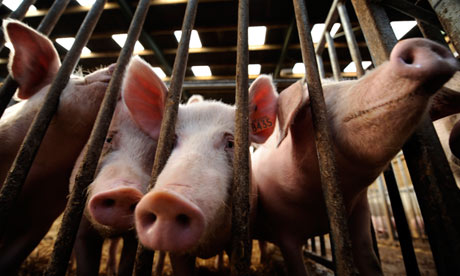NOBULL: The animal welfare and antitrust issues behind America’s cheap meat
The animal welfare and antitrust issues behind America’s cheap meat
An unlikely alliance is taking action against the country’s powerful meat industry and the federal policies that support them
Friday 14 March 2014 11.46 EDT
Raising animals on a large scale means that often animals are moved from an outside setting to an indoor caged environment where they have little room to move. Photograph: Christopher Thomond for the Guardian
Like politics, industrial-scale meat production creates strange bedfellows. Animal welfare advocates are joining up with farmers, environmentalists and supporters of stronger antitrust laws in the hope of engaging consumers on the issues involving the meat they buy. The aim? To counter the power of big meat companies like Tyson Foods and JBS, the world’s largest protein company and the owner of brands including Pilgrim’s Pride and Kraft.
"Maybe it’s time for a citizens revolt," says Barry Lynn, director of the markets, enterprise and resiliency initiative at the New America Foundation. Lynn was speaking at a half-day forum in Washington called "The New Meat Monopoly: the animal, the farmer and you in the new age of global giants".
The accusations thrown at the so-called global meat giants were mostly familiar. By raising and slaughtering chicken, pigs and cattle on a large scale – about eight billion chickens will be raised and killed this year in the US – these companies squeeze out family farmers, treat animals cruelly, create waste and air pollution, and feed their livestock antibiotics that, over time, put human health at risk and raise healthcare costs, at least according to their critics.
What’s more, these critics argue, is that the meat industry’s consolidation and power have been supported by government policy. Subsidized corn and soy reduce the price of meat. Bank loans to farmers are backstopped by the USDA’s Farm Service Agency. Government regulations make it harder to build and operate small-scale slaughterhouses.
And, most irritating to some critics, are the government-managed programs, financed by farmers and ranchers, that support marketing campaigns like "Beef: it’s what’s for dinner" or "Pork: the other white meat". These campaigns imply that all beef or all pork is alike, effectively blurring the lines between the big companies that produce commodity meat (some imported from overseas) and the small-scale ranchers who want to reach consumers who care about their humane or environmentally-friendly practices.
The concentration of power in the meat business was assailed by, among others, chicken farmers and cattle ranchers; Christopher Leonard, author of The Meat Racket: the Secret Takeover of America’s Food Business, which argues that big integrators like Tyson "keep farmers in a state of indebted servitude, living like modern-day sharecroppers on the ragged edge of bankruptcy". The morning’s keynote speaker was none other than Wayne Pacelle, the president and CEO of the Humane Society of the United States (HSUS), the nation’s largest animal protection organization.
When it comes to animal agriculture, Pacelle succinctly described the humane society’s four goals – "Less cruelty. More husbandry. Fewer animals. More farmers to care for them" – before elaborating on each.
Less cruelty: "We are deeply distressed by the industrialization of agriculture, where animals have been moved from outdoor settings where they can feel soil beneath their feet and the sun on their backs." Instead, they are "confined in cages and crates barely larger than their body".
More husbandry: "We want to value farmers who are actually farming, and tending to the animals." He quoted a farmer who told him that "the animals on his farm have just one bad day."
Fewer animals: "We can’t responsibly raise nine billion animals in this country for food." People should eat less beef and value it more.
More farmers: "What we’re trying to do is connect people to their food, to make responsible choices."
Although he is a vegan, Pacelle noted that HSUS has established state agriculture councils to support farmers and ranchers "who give proper care to their animals and promote environmentally sustainable agriculture".
Joining him, to that end, is Andrew Gunther (no relation), who directs an organization called Animal Welfare Approved that audits, certifies and supports farmers who meet what it describes as "the highest animal welfare standards", by raising animals outdoors on pasture or range.
Meat that passes the group’s standards is labeled as Animal Welfare Approved, thereby enabling consumers to distinguish between responsible farmers and "the large corporations that pretend to be farmers", says Gunther, a former Whole Foods executive.
To be sure, consumers have benefited from the industry consolidation because meat production is more efficient than ever. The inflation-adjusted price of chicken, for example, has fallen sharply in the last 25 years.
But those prices carry hidden costs, the critics say. As Dudley Butler, a former USDA official, put it: "We’ve drifted into a situation where we say, if a product’s cheaper, that’s OK, no matter what happens in the production chain."
